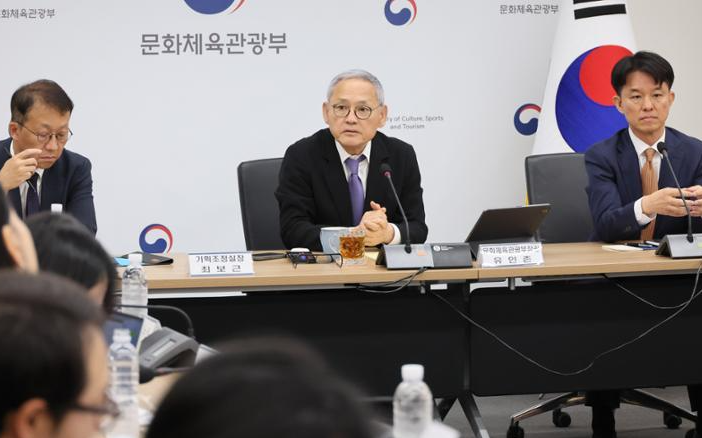
Culture Minister Yu In-chon, center, speaks during a briefing held at National Museum of Modern and Contemporary Art in Seoul’s Jongno District, Thursday. Yonhap
Korean Cultural Centers overseas to serve as key outposts
By Pyo Kyung-min
The Ministry of Culture, Sports and Tourism announced plans to upgrade its international strategy to promote Korean culture globally. As part of the initiative, the ministry will expand Korea Season, a major overseas festival showcasing K-culture’s rich appeal.
The ministry unveiled measures to revise and supplement existing policies to elevate Korea as a global cultural hub during a briefing at the National Museum of Modern and Contemporary Art in Seoul’s Jongno District, Thursday.
The Korea Season festival, first introduced in 2022, is an annual cultural exchange program targeting countries with high potential for K-culture’s success. Designed to showcase Korean culture and foster bilateral exchanges, the event was held in Mexico in 2022 and the United Kingdom in 2023.
This year’s event launched across France earlier this month ahead of the Olympic Games in Paris and is set to continue for six months in other French cities, including Avignon, Aurillac and Nantes.
Culture Minister Yu In-chon outlined specific goals for Korea Season’s expansion, including selecting around 10 target countries for their characteristics, and occasions and appointing a general artistic director to improve the festival’s overall quality.
“Based on this strategic initiative, we will systematically reorganize and expand existing policies,” Yu said in the briefing. “We will lead cooperation with various entities and spearhead our country’s advancement as a global cultural hub.”

Audiences applaud for Korean dance crew 1MILLION and France’s Pockemon Crew after their joint performance at the Chatelet Theatre, Paris, May 2 (local time). Courtesy of Ministry of Culture, Sports and Tourism
The ministry also announced plans to revamp existing policies, including strengthening the functions of Korean Cultural Centers worldwide, extending the role of the King Sejong Institute — a Korean language education institution overseen by the ministry — and providing support for companies seeking to export content.
The functions of the 42 Korean Cultural Centers around the world will be reinforced through improved management, including enhanced training for their directors. In regions without a Cultural Center, the King Sejong Institute will gradually expand its role to serve as a substitute for the Korean Cultural Center.
Cultural content exports will be diversified beyond K-pop and K-drama to include traditional culture, crafts, fashion and publishing. To support this, new content business centers will be established this year in 10 locations, including Singapore, India, Australia and Spain, with the goal of increasing to 50 by 2027.
Additionally, the government will assist K-content-producing companies aiming to enter foreign markets by providing contract review, marketing strategy consultation and new market information. Financial support, copyright protection and specialized translation personnel training will be expanded to create a stronger export foundation.
Yong Ho-sung, deputy minister from the International Cultural Affairs and Public Relations Office, explained the background of these policy enhancements.
“Until the mid-2010s, hallyu, or the Korean wave, was considered a minority phenomenon and was not part of the mainstream culture outside Asia. However, global mainstream media have increasingly focused on Korea, recognizing its cultural richness,” Yong said.
“Nowadays, there is a growing interest not only in hallyu content itself but also in the systems that enabled such growth. There is significant attention on Korea’s excellent content production system and artist training programs. Riding this wave, we aim to become a role model for other countries by comprehensively restructuring our international policies.”



